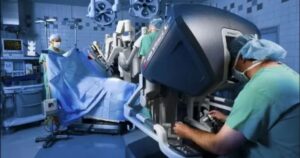Robotics research is significantly impacting the field of healthcare introducing innovations that enhance patient care streamline procedures and improve overall medical outcomes.
From surgical robots to robotic exoskeletons the integration of robotics in healthcare is transforming how medical professionals approach diagnosis or treatment and rehabilitation.
This article explores various applications of robotics in healthcare examining its benefits and future potential.
How Can Robotics Be Used in Healthcare?
Robotics is used in healthcare for a variety of applications surgical procedures or patient rehabilitation and medical diagnostics. Surgical robots such as the da Vinci Surgical System enable surgeons to perform minimally invasive procedures with high precision.These robots offer enhanced dexterity and control allowing for smaller incisions or reduced blood loss and faster recovery times.
In rehabilitation robots help patients recover from injuries and surgeries through targeted physical therapy exercises. Medical diagnostics also benefit from robotics with automated systems aiding in tasks like sample analysis and imaging.

The Role of Surgical Robots in Modern Medicine
Surgical robots are revolutionizing modern medicine by providing surgeons with advanced tools for performing complex procedures.These robots are equipped with high definition cameras and precise instruments that allow for meticulous operations with minimal invasiveness.
The enhanced visualization and control offered by surgical robots lead to more accurate procedures or fewer complications and quicker recovery for patients. The technology also allows for remote surgeries where surgeons can operate on patients from different locations broadening access to specialized care.
Robotics in Patient Rehabilitation
Robotics plays a crucial role in patient rehabilitation by assisting with physical therapy and mobility training. Robotic exoskeletons for example are designed to support and enhance the movement of patients with spinal cord injuries or neurological disorders.
These devices help patients regain mobility by providing the necessary support and guidance during rehabilitation exercises.The robotic systems offer personalized therapy programs that adapt to individual patient needs improving the effectiveness of rehabilitation and accelerating recovery.

How Robotics Is Changing the Future of Healthcare
The future of healthcare is being shaped by advancements in robotics which are enhancing both the quality and accessibility of medical care.Robotics is enabling the development of advanced diagnostic tools or more effective treatment options and improved patient outcomes.Innovative telemedicine robots allow healthcare professionals to remotely monitor and interact with patients or expand access to care in underserved areas.
Furthermore the integration of artificial intelligence with robotics is driving the creation of smarter systems that can analyze data and make informed decisions paving the way for more personalized and efficient healthcare solutions.
The Impact of Robotic Systems on Medical Diagnostics
Robotic systems are making significant strides in medical diagnostics by automating complex tasks and improving accuracy. Automated laboratory robots for example can process and analyze samples with high precision reducing the likelihood of human error and increasing throughput. In imaging robotic systems assist in capturing high resolution scans and providing detailed analyses.
The use of robotics in diagnostics leads to faster results.The more accurate diagnoses and better patient management.

Robotic Assistance in Surgery
The use of robotics in surgery is transforming how procedures are performed.Robotic assisted surgery provides surgeons with enhanced visualization or precision and control leading to better outcomes and reduced recovery times for patients.
The ability to perform complex maneuvers through small incisions minimizes tissue damage and decreases the risk of infection. The technology also facilitates minimally invasive surgeries which offer patients less pain and shorter hospital stays compared to traditional methods.
Innovations in Robotic Rehabilitation Therapy
Robotic rehabilitation therapy is advancing with innovations that enhance the effectiveness of physical therapy. Modern rehabilitation robots are equipped with advanced sensors and algorithms that adjust therapy programs based on real time feedback from patients.
These robots provide targeted exercises that address specific areas of weakness or injury improving the rehabilitation process.The robotic systems can track patient progress and adjust therapy intensity to optimize recovery outcomes.
The Benefits of Robotics in Elderly Care
Robotics is increasingly being used in elderly care to improve quality of life and provide assistance with daily activities. Robots designed for elderly care can help with tasks such as medication management, mobility support and companionship.
For example robotic assistants can remind patients to take their medications or monitor vital signs and provide alerts in case of emergencies.The use of robotics in elderly care helps individuals maintain independence and receive support in a safe and comfortable environment.
Robotics and Remote Healthcare Services
Robotics is playing a pivotal role in remote healthcare services particularly through telemedicine robots. These robots enable healthcare professionals to interact with patients and provide medical consultations from a distance.
Telemedicine robots are equipped with video conferencing capabilities or diagnostic tools and robotic arms that can perform basic examinations. This technology is especially beneficial in rural or underserved areas where access to healthcare services may be limited. Remote healthcare services facilitated by robotics ensure that patients receive timely and effective care regardless of their location.
The Role of Robotics in Medical Research
Robotics is contributing significantly to medical research by enabling the automation of experimental processes and data collection. Research robots can conduct repetitive tasks with high precision freeing up researchers to focus on analysis and interpretation.
The robotic systems are used in drug discovery and development where they automate screening processes and test potential treatments. The integration of robotics in medical research accelerates the development of new therapies and advances our understanding of various medical conditions.
How Robotics Enhances Patient Safety
Patient safety is a top priority in healthcare and robotics plays a crucial role in enhancing it. Robotic systems designed for surgical procedures provide precise control and reduce the risk of human error. In rehabilitation robots ensure that patients perform exercises correctly and safely minimizing the risk of further injury.
The robots used in elderly care can monitor patients conditions and detect potential issues providing timely intervention to prevent accidents or complications.
The Future of Robotics in Healthcare
The future of robotics in healthcare looks promising with ongoing advancements and innovations. Emerging technologies robotic assisted diagnostics or advanced rehabilitation systems and AI powered healthcare robots are set to transform the industry.
The continued development of robotics will likely lead to more personalized and efficient healthcare solutions improving patient outcomes and expanding access to care. As technology evolves robotics will play an increasingly vital role in shaping the future of medicine.
Conclusion
The integration of robotics in healthcare is bringing about transformative changes that enhance patient care or improve medical outcomes and streamline healthcare processes. From advanced surgical robots to innovative rehabilitation systems or robotics is playing a crucial role in shaping the future of medicine.
As technology continues to advance the impact of robotics in healthcare will grow offering new opportunities for improving the quality and accessibility of care. The ongoing research and development in robotics promise to drive further innovations ultimately benefiting patients and healthcare professionals alike.
FAQs
How can robotics be used in healthcare?
Robotics can be used in healthcare for surgical procedures or patient rehabilitation medical diagnostics and elderly care.
How is robotics changing the future of healthcare?
Robotics is changing the future of healthcare by enabling advanced diagnostic tools or improving surgical precision or enhancing patient rehabilitation and expanding remote healthcare services.
What is a large function of robotics in today’s medicine?
A large function of robotics in today’s medicine enhances surgical precision automating diagnostic tasks and supporting patient rehabilitation.
How has robotics helped with research?
Robotics has helped with research by automating repetitive tasks or improving data collection accuracy and accelerating drug discovery processes.

Welcome to our robotics technology hub I’m Evan Clark, your guide to the latest innovations and advancements in the world of robotics.












